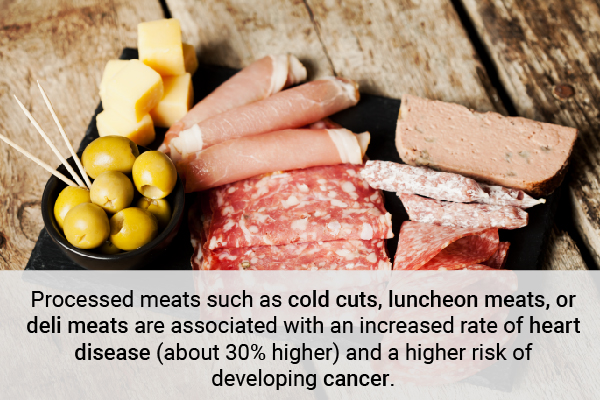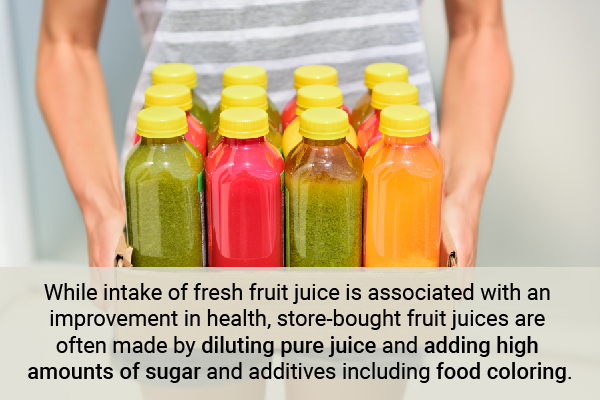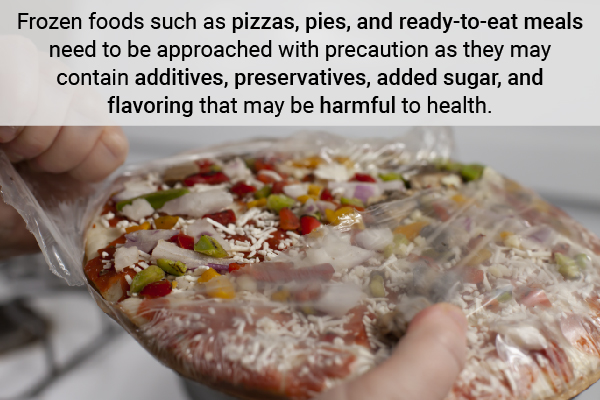In this article:
With the modern busy schedule that almost everyone sets for themselves, grocery shopping can seem a tedious chore. Add to it foods and ingredients that would require preparation and it may look like you have set yourself a gigantic task.

In an attempt to circumnavigate this, and also to make cooking and eating a little bit easier, you take a shortcut and pick easy-to-consume and ready-to-eat meals.
But have you looked into the possible health consequences of these convenient foods? Though they may be packaged and promoted as healthy foods, there might be ingredients you are not paying attention to, which can be detrimental to health.
Things You Need to Stop Buying From Health Food Stores
Take a look at what science and evidence have to say about these food items from the health food store.
1. Processed foods
Processing fruits, vegetables, and meat is a way to preserve them longer than they would last naturally. (1)
To do this, they are treated either with salt, sugar, or fat. Based on the level and extent of processing, foods can be:
- Minimally processed foods, wherein foods are just minimally treated to improve shelf-life
- Processed foods, which include canned fruits and vegetables stored in sugar or salt syrups
- Ultra-processed foods, such as biscuits, chips, reconstituted meats, and sauces (1)
While minimally processed foods are generally safe as they are often just peeled or cut fruits and vegetables packaged for convenience, processed and ultra-processed foods may contain additives such as preservatives, emulsifiers, acidity regulators, flavor enhancers, and artificial flavors. (1)
Several studies have linked the consumption of processed foods to several diseases including diabetes, heart diseases, obesity, depression, and even cancer. (1)
2. Cold cuts

Most dietary recommendations, including the DASH diet (2) and the Mediterranean diet, (3) suggest the consumption of lean cuts of meat that are lesser in fat. (4)
Processed meats such as cold cuts, luncheon meats, or deli meats are associated with an increased rate of heart disease (about 30% higher) and a higher risk of developing cancer. This can be attributed to the high amount of sodium in these types of meats. (4)
3. Canned foods
Canned foods such as meats, fruits, and vegetables preserved in sugar or salt syrups and canned beans have a risk of being contaminated with bisphenol A (BPA), a synthetic component that can interfere with endocrine functions in the body.
BPA is often found in plastic and the inner enamel coating of canned foods. BPA can easily leach into food and cause contamination. (5)
BPA can cause male and female infertility, cancers of the breast and prostate, and polycystic ovarian syndrome (PCOS) in women. (6)
4. Breakfast cereals
Breakfast cereals such as corn flakes, wheat flakes, ready-to-cook oats, muesli, and granola may seem like a healthy breakfast choice for people with busy schedules and school-going children.
Evidence suggests that breakfast cereal consumption can improve the risk of obesity, diabetes, cardiovascular diseases, hypertension, and even mental health issues. (7)
However, not all of these breakfast cereals are made with whole grains, and many are often high in sugar and other additives. Research has shown that most of the cereals targeted toward children contain high amounts of sodium, sugar, and fat and contain very little nutritive value. (8)
A diet high in sugar, salt, and fat with little to no fiber can contribute to obesity, diabetes, and even heart diseases. (9) Therefore, it is best to avoid buying breakfast cereals, especially for children.
5. Granola bars

Granola bars have gained a lot of fame recently, especially in the fitness community. They are often enriched with protein, fiber, and other nutrients and labeled to be healthy snacks. (10)
Studies on market research have found that not all granola bars are healthy. Most are high in sugar, not all are rich in fiber, and some may not contain healthy ingredients. (11)
It is, therefore, necessary to choose these kinds of products wisely.
6. Salad dressings
Store-bought salad dressings are fine when consumed in moderate amounts; however, long-term reliance on them can be harmful to health.
Salad dressings often contain a large amount of added sugar and sodium, in addition to preservatives and other additives. (12) Daily consumption of large amounts of sodium is indicated in the development and worsening of heart diseases. (13)
It is always better to use homemade salad dressings using quality ingredients in moderation.
7. Flavored milk and yogurt
Flavored milk and yogurt using berries, other fruits, or chocolate, vanilla, and caramel are attractive snack choices, especially for children. But these often come with high amounts of added sugar. (14)
Excessive added sugar in the diet is associated with the development of obesity, type 2 diabetes, insulin resistance, heart diseases, and an imbalance of cholesterol in the body. (15)
Instead of buying these products, you can make milkshakes and flavored yogurt at home by blending fresh fruits. The natural sweetness is often enough to make a palatable snack.
8. Fruit juices

While intake of fresh fruit juice is associated with an improvement in health, (16) store-bought fruit juices are often made by diluting pure juice and adding high amounts of sugar and additives including food coloring.
The added sugar poses a risk for obesity in young children. (17)
9. Soft drinks
Soft drink or aerated beverage consumption has increased over the years, with children and adolescents most likely to consume them more. (18) Soft drinks are high in sugar and can cause acidity. They can also worsen oral health and play a role in the development of obesity. (18)
A Basic Guide to Choosing Healthy Products
When grocery shopping, remember that not all products that seem convenient will be healthy, but it isn’t also necessary that every packaged food is unhealthy.
Recently, many companies are coming out with low-sugar or no-sugar-added varieties of products.
Here are a few things you can do to make sure you pick the best products for your health:
- Read food labels. They give you information on vitamin and mineral content, calories, serving sizes, ingredients including added sugar and sodium, and allergen information. (19)
- Choose minimally processed foods such as cleaned and cut vegetables and meats.
- Select healthy alternatives such as nuts and seeds, whole-grain breads and crackers, fresh fruits, and vegetables.
Most-Asked Questions
Can I buy fruit juices fortified with vitamins and minerals?
When a product is labeled fortified, it is usually true. However, the added sugar and additives in the juices are not worth the extra fortification. Instead, choose fresh fruits and juice them at home.
Are frozen foods bad?
Frozen fruits and vegetables are generally not bad for health. Freezing usually preserves the texture, flavor, and nutrients in the food as the food does not undergo any treatments and usually does not contain additives that are harmful to health.
It is important to read the nutritional information to identify the ingredients in the package. (20)
What types of frozen food should I avoid?

Frozen fruits, vegetables, and meats are generally safe to consume for most people. Frozen foods such as pizzas, pies, and ready-to-eat meals need to be approached with precaution as they may contain additives, preservatives, added sugar, and flavoring that may be harmful to health.
Final Word
Grocery shopping can seem a tedious task, especially with busy schedules. This is one of the main reasons people turn to easy-to-consume foods without realizing how harmful they can be to health.
Many of the foods discussed in this article have been chosen due to their high sugar, sodium, or fat content, all of which are implicated in the development of obesity, heart diseases, diabetes, and even cancer.
It is very important to learn how to read nutritional labels to be well-informed about the ingredients in a product to make healthy choices for yourself and your family.
- Was this article helpful?
- YES, THANKS!NOT REALLY


